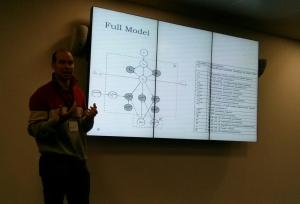This blog post is about a bridge I created that allows you to pass callbacks to Python functions directly to Matlab code without having to resort to things like sockets or COM.
Background
Designing our UAVs involves a number of different codes that interact & must be coordinated to solve what is essentially a Multidisciplinary Design Optimization (MDO) problem. One of those codes is written in Python and involves a constrained optimization problem of the following kind:
Find the minimum of a problem specified by

x, b, beq, lb, and ub are vectors, A and Aeq are matrices, c(x) and ceq(x) are functions that return vectors, and f(x) is a function that returns a scalar. f(x), c(x), and ceq(x) can be nonlinear functions.
In our case we have 10 variables (x has length 10), 28 nonlinear constraint functions c(x), 4 nonlinear equality constraint functions ceq(x) and box constraints on most variables. The objective function f(x) and all constraint functions are pure python functions.
Thus to optimize f(x) you need an optimizer that can handle python functions, and for that there is the excellent openopt library. This is what I did and after trying out the different NLP solvers I settled on the scipy_slsqp solver for most runs as it seemed to consistently give the best results.
However, as the optimization problem was tweaked and as we did more runs, we did run into cases where it would not solve and the aeronautical engineers I work with were not always happy with its robustness. Also nobody had ever worked with the openopt library but everybody knew and trusted the various Matlab solvers. Besides, us being part of the Computational Engineering Design Group, a number of powerful in-house Matlab solvers had been developed and were available to me. Thus, the least I could do was to try to use those and see if that improved anything.
Python-Matlab bridge
So I started searching the web for tools / libraries that allowed me to bridge python/Matlab, specifically tools that supported passing callbacks between the two languages. A promising project seemed mlabwrap but while it was great for evaluating Matlab expressions, it does (at the time of writing) not support callbacks.
In the end I decided to see if I could scratch my own itch. I really did not want to deal with sockets or any kind of network protocol and I also wanted the solution to be crossplatform, so no COM. Since both Python and Matlab have well documented interfaces with C/C++ code, that seemed to be the way to go.
So I sat down with the ctypes & mex documentation and with a little help from Mathworks support was able to cobble together a simple example using fminsearch. By the way, I had never done any Python – C work before, but ctypes is awesome and a joy to use. The little trick to make it all work is that you just have to treat the function handle as an integer (it’s just a memory address after all). Then all you are really doing is passing an integer around which is straightforward.
With fminsearch working the goal was to extend to fmincon since that would give us all the basic functionality needed. This took a bit of debugging and deciphering Matlab crash dumps but I finally got it working. The final flow of events looks like this:

You start off with writing a matlab file that wraps the optimizer you are interested in (in this case fmincon) and exposes its signature. This m file forwards all function handle arguments to a mex file which converts the integer to a function pointer and calls it. This is how we get the callback to a C function. A simple bridge library is then needed which is loaded by ctypes and converts the arguments into something the Matlab shared library file understands.
From my initial tests I see it is finding the same optima as scipy_slsqp was using openopt. Now I just need to do more extensive testing to see if performance is any more robust. After that I can start looking into the other solvers provided by Matlabs optimization toolboxes as well as our own solvers.
Source code
All the code is available on github. I hope it is useful to somebody and I’d be very happy to receive patches or improvements. I guess this may even be of use to the mlabwrap / openopt projects.
–Dirk


 One of the projects I have been involved with recently was a collaboration with the
One of the projects I have been involved with recently was a collaboration with the 
 Its 8:44 am and after 5 hours of sleep on my trusty Thermarest I feel quite refreshed, which is more than I can say about the people around me. Some have capitulated and lay scattered around the brightly lit room under their coats in front of their MacBook Air’s. Others are still in exactly the same position I left them 5 hours ago but the intensity has gone and eyes have glazed over. At least one person confirmed the geek stereotype and didn’t manage to hold his beer.
Its 8:44 am and after 5 hours of sleep on my trusty Thermarest I feel quite refreshed, which is more than I can say about the people around me. Some have capitulated and lay scattered around the brightly lit room under their coats in front of their MacBook Air’s. Others are still in exactly the same position I left them 5 hours ago but the intensity has gone and eyes have glazed over. At least one person confirmed the geek stereotype and didn’t manage to hold his beer. I have
I have 



